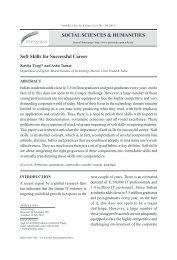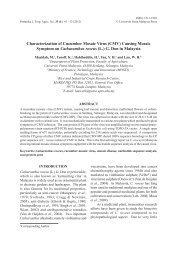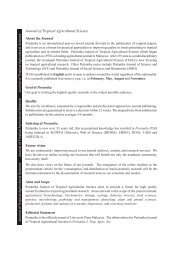JST Vol. 21 (1) Jan. 2013 - Pertanika Journal - Universiti Putra ...
JST Vol. 21 (1) Jan. 2013 - Pertanika Journal - Universiti Putra ...
JST Vol. 21 (1) Jan. 2013 - Pertanika Journal - Universiti Putra ...
Create successful ePaper yourself
Turn your PDF publications into a flip-book with our unique Google optimized e-Paper software.
Using SVMs for Classification of Cross-Document Relationships<br />
TABLE 1: Some examples of the CST relationship between sentences (source: Zhang et al., 2002)<br />
Relationship Description Text span 1 (S1) Text span 2 (S2)<br />
Identity The same text appears in<br />
more than one location<br />
Equivalence Two text spans have the<br />
same information content<br />
Translation The same information<br />
content in different<br />
languages<br />
Subsumption S1 contains all<br />
information in S2, plus<br />
additional information<br />
not in S2<br />
Tony Blair was elected<br />
for a second term today.<br />
Derek Bell is<br />
experiencing resurgen0ce<br />
in his career.<br />
Shouts of “Viva la<br />
revolucion!” echoed<br />
through the night.<br />
With 3 wins this year,<br />
Green Bay has the best<br />
record in the NFL.<br />
Contradiction Conflicting information There were 122 people on<br />
the downed plane.<br />
Historical<br />
Background<br />
S1 gives historical<br />
context to information<br />
in S2<br />
This was the fourth<br />
time a member of the<br />
Royal Family has gotten<br />
divorced.<br />
<strong>Pertanika</strong> J. Sci. & Technol. <strong>21</strong> (1): 283 - 298 (<strong>2013</strong>)<br />
Tony Blair was elected<br />
for a second term today.<br />
Derek Bell is having a<br />
“comeback year.”<br />
The rebels could be heard<br />
shouting, “Long live the<br />
revolution”.<br />
Green Bay has 3 wins<br />
this year.<br />
126 people were aboard<br />
the plane.<br />
The Duke of Windsor<br />
was divorced from the<br />
Duchess of Windsor<br />
yesterday.<br />
In another related work, Miyabe et al. (2008) investigated on the identification of CST<br />
relationship types by using cluster-wise classification with SVM classifier. They used a<br />
Japanese cross-document relation corpus annotated with CST relationships. The authors<br />
proposed using the detected “Equivalence” relations to address the task of “Transition”<br />
identification. In particular, similarity through the variable noun phrases was used for transition<br />
identification. They obtained F-measure of 75.50% for equivalence and 45.64% for transition.<br />
However, their approach is only limited to the two aforementioned relations.<br />
Closely related to our work is the approach by Zahri and Fukumoto (2011). The authors<br />
determined five types of CST relation between sentences using SVMs. The authors computed<br />
the lexical features between sentence pairs using the dataset from the CSTBank corpus. Then,<br />
they used the identified CST relations to determine the directionality between the sentences<br />
for PageRank (Erkan & Radev, 2004) computation. However there were no experimental<br />
results specifically shown on the performance of their CST relationship classification. This<br />
is essential because the performance of the classification has direct implication on the final<br />
results of the system.<br />
METHODS<br />
Relying on manually annotated text for CST relationship identification consumes a lot of time<br />
and resources. Thus, it is favourable to have a system which can automatically identify the<br />
existence of the CST relations between pairs of sentences. However, at this point of time, we<br />
are only considering four types of CST relations, namely “Identity”, “Overlap”, “Subsumption”,<br />
and “Description”. More details of these relations are given in Table 2. Meanwhile, further<br />
details with examples can be found in Zhang et al. (2002).<br />
241





